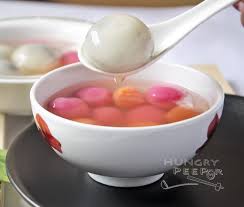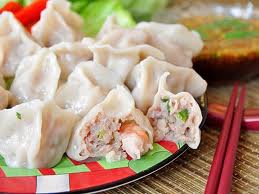Winter Solstice Festival ~ from HanBan
What is Winter Solstice Festival?
The Winter Solstice Festival is one of the most important festivals celebrated by the Chinese and other East Asians during the Dongzhi solar term (winter solstice) on or around December 22 when sunshine is weakest and daylight shortest. It is a festival even equivalent to the New Year in the past, telling people that the winter days have come formally. It is also known as "Chinese Thanksgiving", The coming of winter is celebrated by families and is traditionally the time when farmers and fishermen gather food in preparation for the coming cold season. It is also a time for families to come together.
The Origin of Winter Solstice Festival
The Winter Solstice Festival is one of the most important festivals celebrated by the Chinese and other East Asians during the Dongzhi solar term (winter solstice) on or around December 22 when sunshine is weakest and daylight shortest. It is a festival even equivalent to the New Year in the past, telling people that the winter days have come formally. It is also known as "Chinese Thanksgiving", The coming of winter is celebrated by families and is traditionally the time when farmers and fishermen gather food in preparation for the coming cold season. It is also a time for families to come together.
The Origin of Winter Solstice Festival

According to the traditional Chinese lunar calendar, one year can be divided into 24 solar terms, and the Winter Solstice is one. The Winter Solstice Festival has its origins in the Chinese concept of yin and yang, which represents balance and harmony in life. It’s believed that the yin qualities of darkness and cold are at their most powerful on the shortest day of the year, but also at their turning point to give way to the light and warmth of yang. For this reason, the Winter Solstice Festival is a time for optimism. This festival can be traced back to the yin and yang philosophy of balance and harmony in the cosmos. After this celebration, there will be days with longer daylight hours and therefore an increase in positive energy flowing in. It is believed that the yin qualities of darkness and cold are at their most powerful at this time, but it is also the turning point, giving way to the light and warmth of yang. For this reason, the Dong Zhi Festival is a time for optimism. Dong Zhi is celebrated in style. The longest night of the year is a time to put on brand new clothes, visit family with gifts and to laugh and drink deep into the long night.
In ancient China, the Dongzhi Festival was a grand day. In Zhou Dynasty, great ceremony to offer sacrifice to heaven would be held, when the Winter Festival was the same as the New Year. It was until Wudi Emperor of Han Dynasty adopted the traditional Chinese calendar that the New Year’s Day was separated from the Winter Festival. While before that, the emperors, officials and ordinary people even dropped their works to celebrate this day solemnly!
The Traditional Customs and Activities on This Day
Traditionally, the Dongzhi Festival is also a time for the family to get together. In some parts of Northern China,
In ancient China, the Dongzhi Festival was a grand day. In Zhou Dynasty, great ceremony to offer sacrifice to heaven would be held, when the Winter Festival was the same as the New Year. It was until Wudi Emperor of Han Dynasty adopted the traditional Chinese calendar that the New Year’s Day was separated from the Winter Festival. While before that, the emperors, officials and ordinary people even dropped their works to celebrate this day solemnly!
The Traditional Customs and Activities on This Day
Traditionally, the Dongzhi Festival is also a time for the family to get together. In some parts of Northern China,
|
Many historical conventions have been passed down to be the customs of the North China Winter Solstice Festival. While the celebrating forms are diversified, people eat dumpling soup on this day; while residents of some other places eat dumplings, saying doing so will keep them from frost in the upcoming winter. But in parts of South China, The night on this day is the longest during a year, so “Winter Solstice rice ball” are made at this night. Children are happy on this day and usually make the rice balls in shape
|
of cute animals. And the rice balls are must ate by couple for good luck. If two balls are left at last, the married will have all their wishes; if one, the unmarried will have success. Fruits and food are used to sacrifice to the ancestors.
Old traditions also require people with the same surname or from the same clan to gather at their ancestral temples to worship on this day. There is always a grand reunion dinner following the sacrificial ceremony. The festive food is also a reminder that we are now a year older and should behave better in he coming year. Even today, many Chinese around the world, especially the elderly, still insist that one is "a year older" right after the Dongzhi celebration instead of waiting for the Chinese New Year.
Old traditions also require people with the same surname or from the same clan to gather at their ancestral temples to worship on this day. There is always a grand reunion dinner following the sacrificial ceremony. The festive food is also a reminder that we are now a year older and should behave better in he coming year. Even today, many Chinese around the world, especially the elderly, still insist that one is "a year older" right after the Dongzhi celebration instead of waiting for the Chinese New Year.
